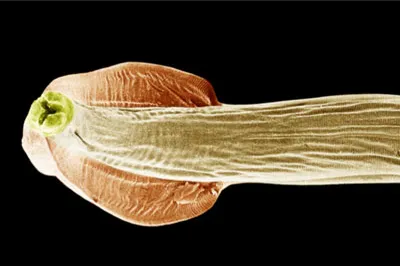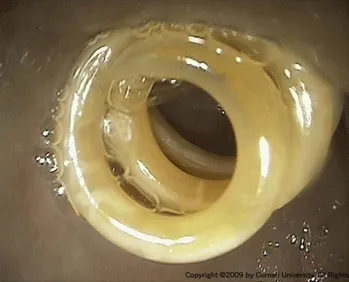Roundworms are incredibly common parasitic worms found in dogs, affecting almost all canines at some point in their lives, especially during puppyhood. These resilient parasites can be contracted in various ways, making them easy to spread and a persistent challenge to control for pet owners. While often associated with canine health, a crucial question many ask is: can you catch round worm from a dog? The answer is yes, and understanding the risks to both your dog and your family is paramount for maintaining a healthy household.
What Are Roundworms and How Do Dogs Get Them?
Roundworms (scientifically known as Toxocara canis in dogs) are spaghetti-like nematodes that reside in the intestines of infected animals. They pose a significant health threat, particularly to young puppies. The lifecycle of roundworms is complex, allowing for several transmission routes.
One of the most common methods of infection is transplacental transmission, where a pregnant mother dog passes the worm larvae to her puppies while they are still in her womb. This means puppies can be born with an existing roundworm infection. Another significant route is transmammary transmission, where puppies ingest worm larvae through their mother’s milk after birth.
Beyond maternal transmission, puppies and adult dogs can become infected by ingesting larvated eggs from a contaminated environment. These eggs are shed in the feces of infected animals and can survive in the soil for extended periods. Dogs can also acquire roundworms by eating paratenic hosts, such as mice or other small mammals, that have roundworm larvae encysted in their tissues. These varied pathways highlight why roundworm infections are so prevalent and challenging to eradicate completely.
Symptoms of Roundworms in Dogs
The presence of adult roundworms in a dog’s intestines can manifest in various ways, though many dogs, especially adults with minor infections, may not show obvious signs. However, puppies and dogs with major roundworm burdens typically exhibit a range of symptoms that warrant immediate veterinary attention.
Common signs of a roundworm infection include diarrhea, often accompanied by vomiting. Affected dogs may also experience significant weight loss despite having a good appetite, and their coat might appear dull and lacklustre. A classic symptom, particularly in puppies, is a distended, potbellied appearance, which is a direct result of the large number of worms residing in their digestive system. In some cases, if the roundworm larvae migrate through the lungs during their lifecycle, the dog may develop a cough. You might visually confirm an infection by noticing adult roundworms in your dog’s feces or vomit. These worms typically appear white or light brown and can be several inches long, resembling spaghetti. If you observe any of these symptoms or worms, it’s crucial to consult your veterinarian promptly.
 Roundworm (Toxocara canis) anterior view, showing the characteristic cervical alae.
Roundworm (Toxocara canis) anterior view, showing the characteristic cervical alae.
Preventing Roundworm Infections in Dogs
Given the numerous ways roundworms can enter a dog’s body, implementing a comprehensive prevention strategy is essential to protect your pet’s health. Maintaining a clean living environment for your dog is paramount. This includes regularly removing feces from your yard or any areas where your dog spends time, as roundworm eggs are shed in stool and can contaminate the soil. Preventing your dog from scavenging or eating wild animals like mice, which can act as intermediate hosts, also reduces the risk of infection.
For puppies, a rigorous deworming schedule is critical. They should be treated at 2, 4, 6, and 8 weeks of age, followed by monthly preventive treatments. Regular fecal (stool) examinations are also vital: 2 to 4 times during the first year of life and 1 or 2 times annually for adult dogs. Nursing mothers should also receive monthly preventive treatment alongside their puppies to minimize the risk of transmitting worms. Many heartworm preventives available today also offer protection against roundworms and other common intestinal parasites. Discuss the most appropriate prevention and treatment choices with your veterinarian to tailor a plan specifically for your dog’s needs. Understanding treatments for other common parasites, such as over the counter giardia treatment for dogs, can also be beneficial in a broader context of pet health.
 Several adult ascarid roundworms visible within a dog's intestine.
Several adult ascarid roundworms visible within a dog's intestine.
The Risk to Humans: Can People Get Roundworms From Dogs?
One of the most concerning aspects of roundworm infections in dogs is the significant risk they pose to humans. This is a common question among pet owners, and it’s essential to be aware of the potential for zoonotic transmission.
Humans can become infected with roundworms primarily through accidental ingestion of contaminated soil or dog feces. Roundworm eggs, once shed in pet waste, can accumulate in substantial numbers in the soil, particularly in areas where pets frequently defecate. When a person, often a child, touches contaminated soil and then puts their hands in their mouth, they can ingest these microscopic eggs.
Once ingested, the roundworm larvae hatch and can migrate through various tissues and organs in the human body, leading to a condition known as visceral larval migrans or ocular larval migrans. The symptoms in humans can vary depending on where the larvae migrate. They can cause eye problems, including vision loss, and may affect the lungs, heart, and even the neurological system, leading to more severe health issues. While less common than roundworms, it’s worth noting that other parasites like can people get heart worms from dogs also highlight the broader importance of parasite prevention. Similarly, being informed about symptoms of giardia in humans from dogs emphasizes the need for comprehensive parasitic awareness.
To prevent human infection, several precautions are necessary. Children, in particular, should not be allowed to play in areas where animals have defecated. Sandboxes should be covered when not in use to prevent pets from using them as litter boxes. Individuals who have direct contact with soil that may have been contaminated by cat or dog feces should wear gloves and wash their hands thoroughly immediately afterward. Regular handwashing, especially before eating, is a simple yet effective measure to reduce the risk of accidental ingestion of eggs. Awareness of other parasites, such as can i get tapeworms from my puppy, also contributes to a holistic approach to pet and human health.
Conclusion
Roundworms are a pervasive and serious threat to both canine and human health. Understanding how dogs acquire these parasites, recognizing the symptoms, and implementing robust prevention strategies are vital for any responsible pet owner. Regular deworming, maintaining a clean environment, and diligent personal hygiene are key to breaking the cycle of transmission. By working closely with your veterinarian and staying informed, you can effectively protect your beloved canine companion and ensure the health and safety of your entire family from the risks of roundworm infection. Always consult your veterinary professional for specific advice tailored to your pet’s needs and to discuss the best preventive care options available.
